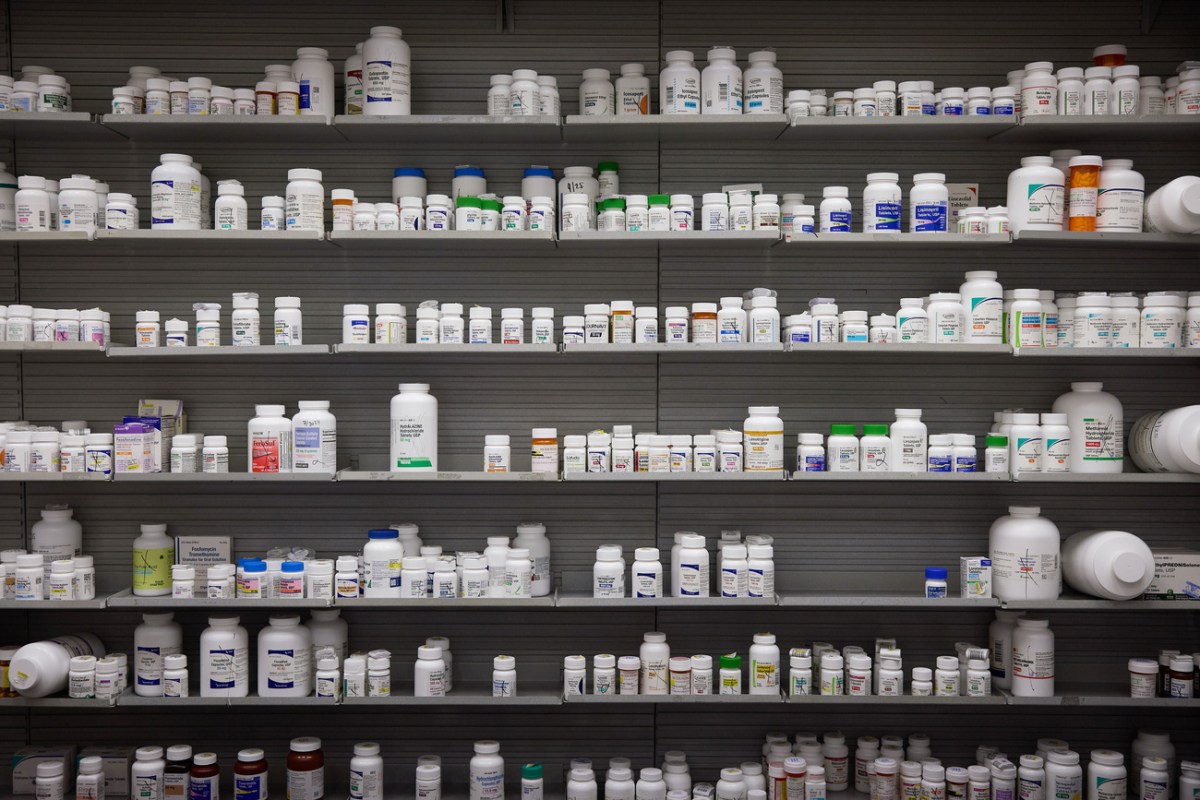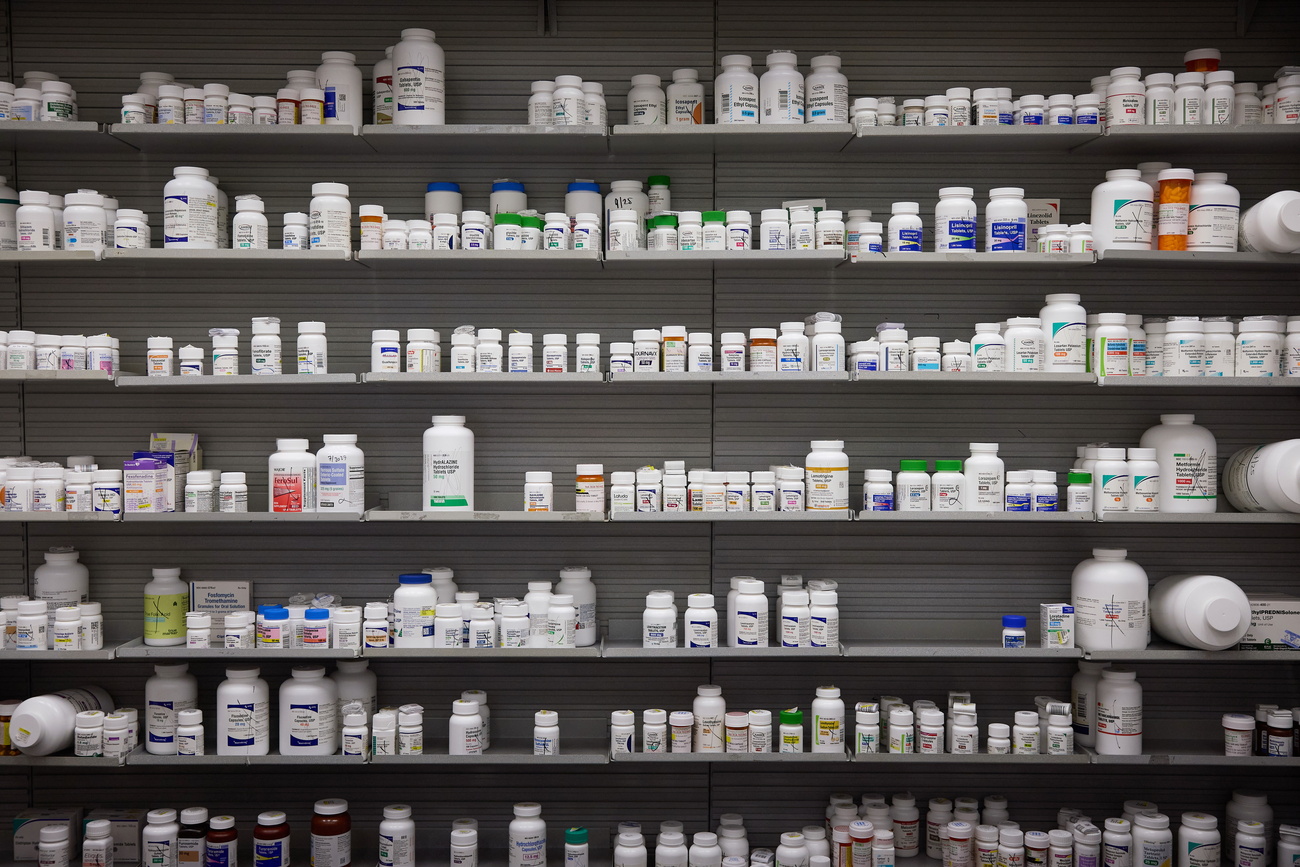
Drug prices are at least 2.5 times higher in the US.
Keystone-SDA
The pharmaceutical industry is a major driver of the Swiss economy, but its strength has also made it a key vulnerability for Switzerland in trade talks with the US.
President Trump’s announcement of a 39% tariff rate on Swiss goods alarmed business leaders and sent politicians scrambling to Washington. The rate is more than double the one negotiated with the European Union (EU), and among the highest globally.
One sector breathed a sigh of relief – the pharmaceutical industry, which was exempt.
But it didn’t take long before fingers were pointed at the industry. “Switzerland is being held hostage by the pharmaceutical industry,” Georges Korn, CEO of Swiss watchmaker Breitling, told the Swiss Neue Zürcher ZeitungExternal link newspaper on August 2. “This affects all export-oriented industries except one: cynically, the pharmaceutical industry, which is responsible for the situation, is exempt from the high tariffs for the time being.”
+ Swiss government reacts with great regret to new US tariffs
Trump has threatened tariffs of over 200% on pharmaceuticals but, aside from a 15% tariff on EU drugs, hasn’t followed through, fearing price hikes.
Korn’s frustration is understandable. Even if tariffs are negotiated down, the watch industry could suffer. Swiss watches need to be 60% manufactured in the country in order to be labeled “Swiss made”, which makes it difficult to move production to avoid tariffs.
Pharmaceuticals make up 50–60% of Swiss exports to the US and contribute significantly to the $40 billion (CHF49.6 billion) trade deficit cited by Trump. In a CNBC interviewExternal link, Trump rejected Swiss president Karin Keller-Sutter’s plea for a lower tariff, arguing the country makes “a fortune with pharmaceuticals”.
Experts suggest the tariffs are meant to incite Switzerland to put pressure on the pharma industry to lower drug prices.
The same day he announced the Swiss tariff rate, Trump sent letters to 17 major pharmaceutical companies – including Swiss giant Novartis and Roche’s US subsidiary Genentech – calling for immediate measures to lower drug prices in the US.
“Trump uses tariffs as a sort of instrument for blackmailing you,” Cecilia Malmström, former European Commissioner for Trade during the first Trump administration and currently a senior fellow at the Washington-based Peterson Institute for International Economics, told Swissinfo. “It’s a way to punish a behavior he doesn’t like.” And in Switzerland’s case – it’s high drug prices.
Gold’s role in the trade deficit
Switzerland’s trade surplus with the US has been inflated by gold imports. After Trump’s election in November 2024, US traders stockpiled gold, fearing tariffs. Switzerland, a major gold hub, saw a spike in exports. Without gold, its CHF48 billion surplus would be CHF25 billion.
The power of pharma
The idea that the Swiss economy is being held hostage by the pharmaceutical industry is misleading and economically untenable, according to Johannes von Mandach, the head of economic research at Zurich consulting firm Wellershof & Partners.
“International trade is not a zero-sum game,” wrote von Mandach in an email. “When a country like Switzerland specialises in a particular product or service, this is not an unfair advantage, but a desirable outcome of an international economy based on the division of labour.”
Malmström agrees, saying that the US claim of being disadvantaged is flawed. “You cannot simplify things to plus and minuses,” she said. “Trade doesn’t necessarily have to be in balance if you trade on equal terms.”
More
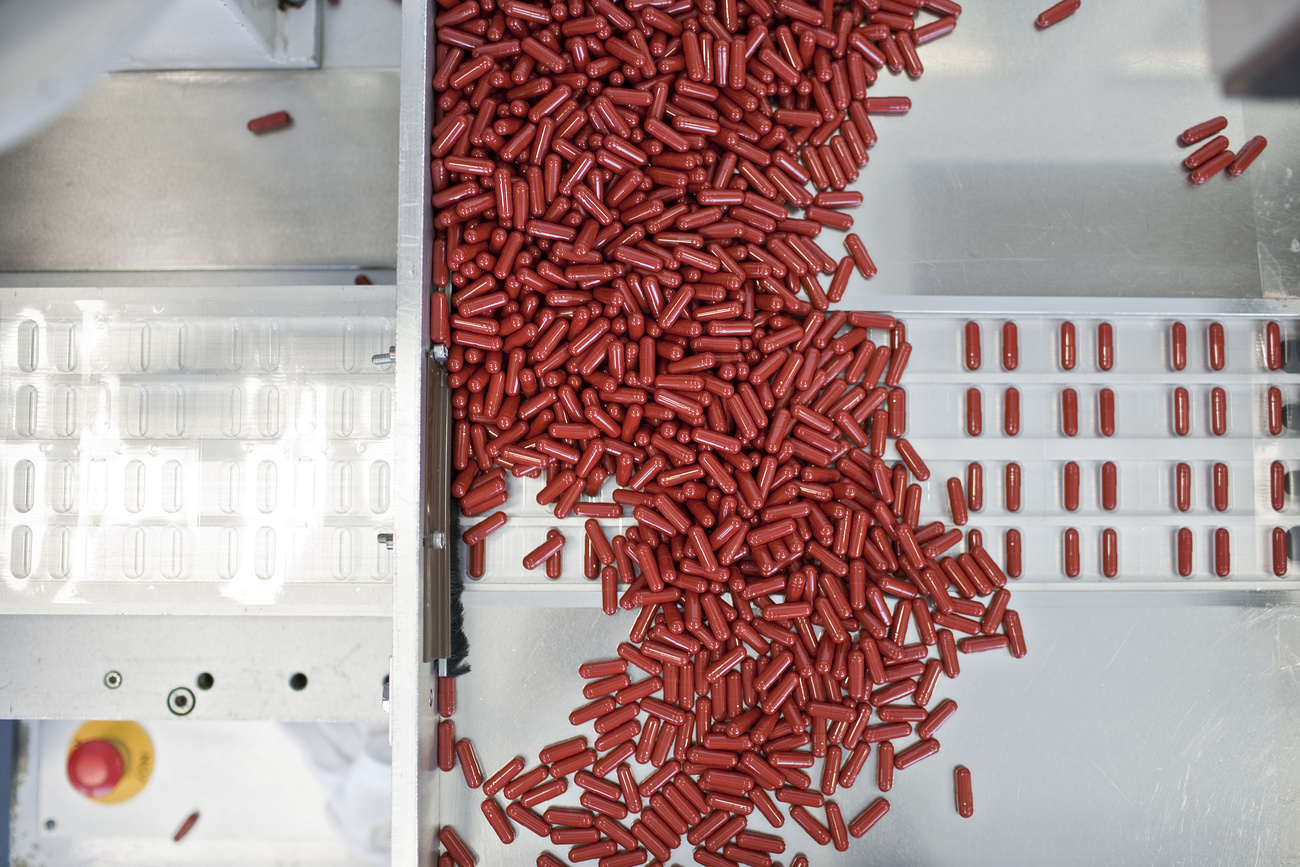
More
Potential US tariff exemption for Swiss pharma is not necessarily a boon
This content was published on
Jul 22, 2025
Donald Trump is pressuring the pharma industry with tariffs. But experts say that tariffs will have less impact on the industry than pricing.
Read more: Potential US tariff exemption for Swiss pharma is not necessarily a boon
Over 30 years, pharma has flourished in Switzerland, thanks to low taxes, a skilled workforce, and a central location in Europe.
The pharmaceutical industry is “one of the few remaining growth drivers of the Swiss economy today,” said von Mandach. “Without it, per capita GDP growth in recent years would have been negligible.” Meanwhile, growth in sectors like banking and manufacturing have stalled due to high costs and regulation, according to von Mandach.
Pharma now generates 7% of Swiss GDP and employs 50,000 people. The country is home to Roche and Novartis, two of the world’s largest pharmaceutical firms. Others, including US-based Merck(MSD) and AbbVie, also operate in Switzerland. US patients benefit too, with many life-saving drugs originating in Swiss labs.
But drug prices are much higher in the US. According to a study by the Rand corporation, Americans pay two-and-a-half times more for prescriptions than Europeans, mainly because Europe regulates prices.
More
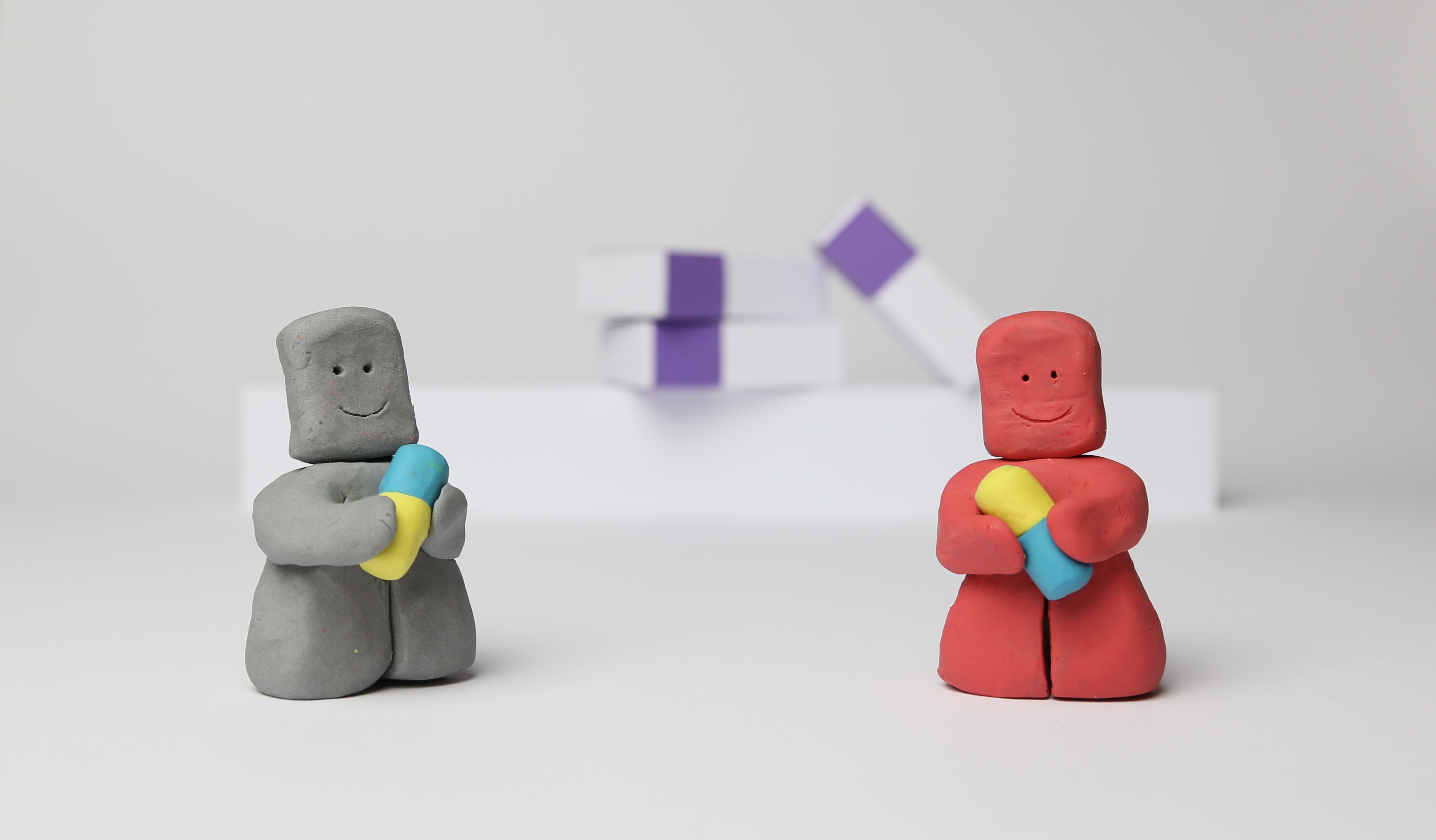
More
How drug prices are negotiated in Switzerland and beyond
This content was published on
Apr 23, 2024
Switzerland’s pharmaceutical sector supplies drugs worldwide, but not all countries receive them with the same price tag. Here’s why.
Read more: How drug prices are negotiated in Switzerland and beyond
With a small domestic market, Swiss pharma relies heavily on the US. That reliance is now a bargaining chip for Trump. “He wants to make an example of Switzerland,” Raiffeisen economist Domagoj Arapovic toldExternal link the Swiss Tages-Anzeiger newspaper
While similar pressure could be applied to Europe, the EU’s larger, more diverse market gives it leverage.
Switzerland’s dilemma
The Swiss government now faces a dilemma. It is eager to lower the tariff rate, but it already scrapped levies on US industrial goods in January 2024; 99% of US goods imports now enter duty-free.
“It can hardly make any further concessions to the US,” said von Mandach. “Trade with the US is already largely liberalised, and Switzerland is one of the most important investors in the US.”
Swiss President Karin Keller-Sutter already pledged around $150 billion in investments into the US, more per capita than other countries. Both Roche and Novartis have committed to multi-billion-dollar investments in the US. They also plan to produce their major drugs for US patients in the US.
Some politicians in Switzerland have called on the government to put pressure on the pharmaceutical industry. Roche is in talks with the US government to cut out intermediaries and sell medicines directly to patients. But lowering drug prices in the US involves much more than a couple of companies.
“Responsibility lies with US policymakers,” said von Mandach. In May, Trump signed the “most-favored nation” order to tie US drug prices to those in developed countries. He claims Americans subsidise global healthcare and wants Europe to raise prices to maintain innovation. The US Congress would have to agree to a law change in order to set drug prices, therefore lowering them.
More
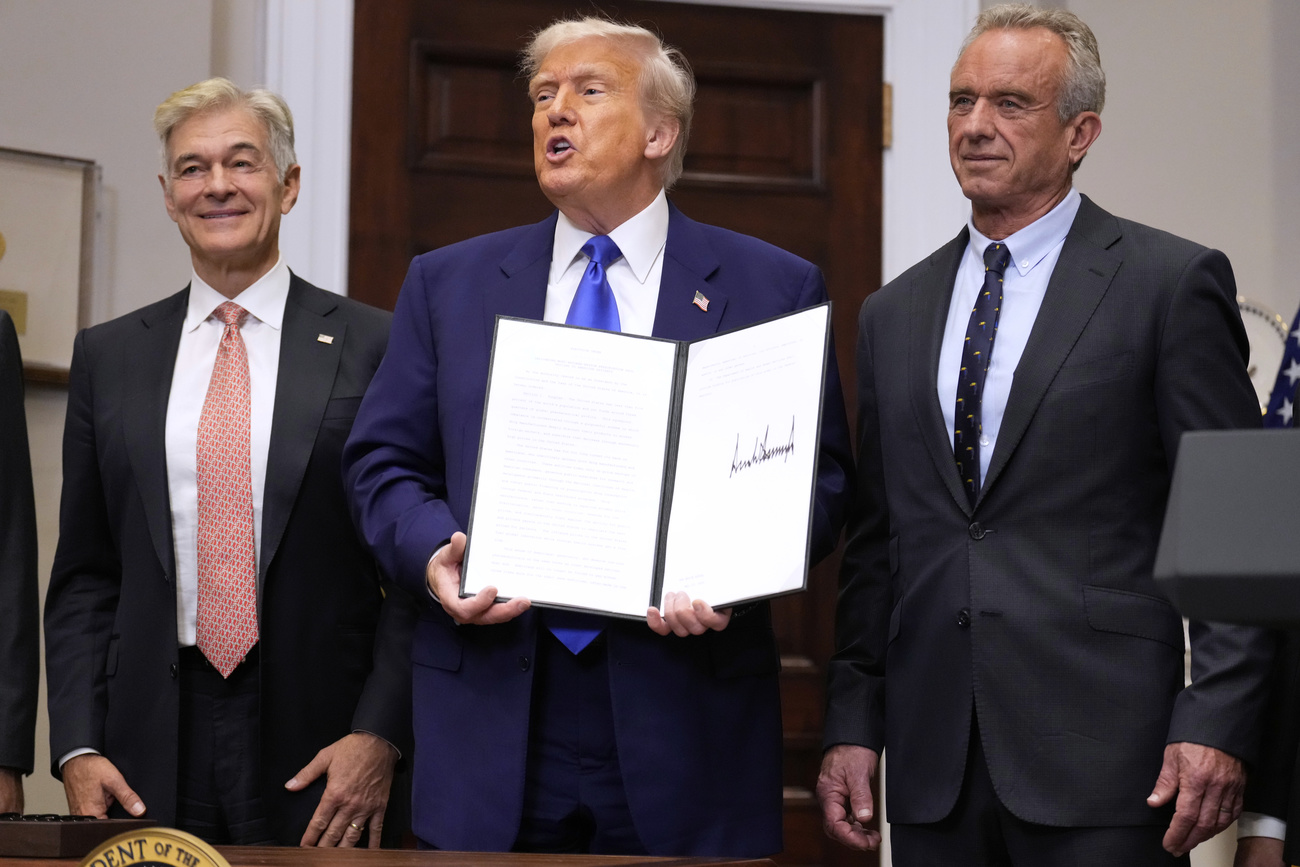
More
Despite Trump’s bold claims, medicine prices in Europe won’t rise anytime soon
This content was published on
May 15, 2025
US President Trump has taken aim at Europe for undercharging for medicine. But raising prices in Europe would face strong pushback.
Read more: Despite Trump’s bold claims, medicine prices in Europe won’t rise anytime soon
In the letterExternal link to 17 drug companies, Trump reiterated his demand for companies to lower prices in line with the MFN order by September 29. He’s also floated tariffs of up to 250% on pharma, but it’s unclear how Switzerland would be affected, given many active ingredients are made elsewhere. It’s also unclearExternal link if the 15% tariff on pharmaceuticals from the EU will lead to higher drug prices.
“Countries are under pressure to get a deal,” Malmström. As of publication, US tariffs on Switzerland are to take effect on August 7. “It is not a traditional deal where you negotiate with the partner in good faith. This is a negotiation under threat.”
Edited by Virginie Mangin/dos
Articles in this story
